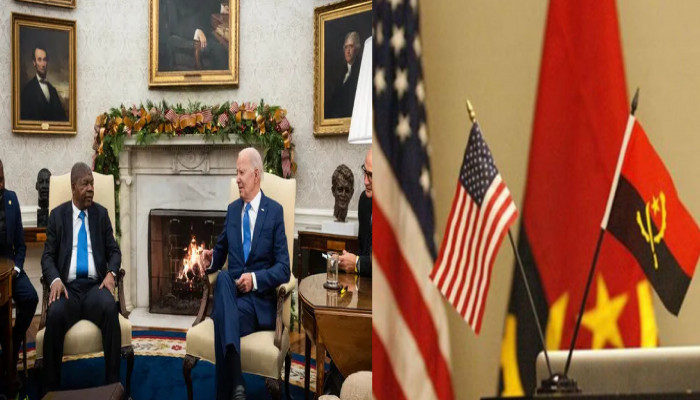Biden's maiden visit to Angola aims to strengthen US-Africa relations
- In Reports
- 01:07 PM, Dec 03, 2024
- Myind Staff
President Joe Biden arrived in Angola on Monday for his first visit to sub-Saharan Africa. He was greeted by cheers from thousands of people. During the visit, he will focus on a major US-supported railway project designed to reduce China's influence in Africa, a continent with over 1.4 billion people.
A major focus of Biden's three-day trip to Angola will be the rehabilitation of the Lobito Corridor railway in Zambia, Congo, and Angola. It seeks to increase American influence in an area abundant in vital minerals used in batteries for electronic devices, electric cars and clean energy technology. A few weeks prior to Republican Donald Trump's inauguration on January 20, Biden's journey fulfils his promise to travel to sub-Saharan Africa.
In the Atlantic Ocean island nation of Cape Verde, he made a quick, behind-closed-door discussion with Prime Minister Ulisses Correia e Silva before continuing to Angola. President Biden plans to meet with Angola's President, Joo Lourenço, in Luanda, the capital, where people gathered to welcome him. He will also visit the National Slavery Museum and travel to Lobito, a port city, to check out a rail project. Biden is expected to announce new developments in health, agribusiness and security, according to White House officials.
Biden was initially scheduled to visit Africa last year after the US-Africa Summit in December 2022. However, his trip was delayed to 2024 and again postponed this October due to Hurricane Milton. This has led some Africans to feel that their continent remains a low priority for the US. Barack Obama made the last trip to sub-Saharan Africa in 2015. Biden did travel to Egypt, North Africa, in 2022 to attend a United Nations climate summit.
John Kirby, the national security spokesman, told reporters on Air Force One during a trip to Angola that he disagrees with the idea that this is a last-minute effort. He pointed out that senior officials, including Vice President Kamala Harris, have already visited Africa. He emphasised that President Biden has been focused on Africa since he took office.
China has a monopoly on Africa's vital resources, making them a crucial area of conflict between the US and China. The US has built strong ties with Africa over the years through trade, security, and aid. Now, an 800-mile (1,300-kilometer) railway upgrade is a new move that resembles China's Belt and Road infrastructure plan. The Biden administration has highlighted this corridor as one of its key initiatives, but the future of Lobito and US involvement in Africa will depend on the incoming Trump administration.
According to Mvemba Dizolele, the director of the Africa Program at the Centre for Strategic and International Studies, the focus has shifted away from President Biden, and even African leaders are now looking toward Donald Trump.
The US has pledged $3 billion to the Lobito Corridor and related projects, along with funding from the European Union, the Group of Seven (G7) industrialised nations, a Western-led private consortium, and African banks. A lot depends on the success of this project and whether it can be replicated, said Tom Sheehy, a fellow at the United States Institute of Peace, a nonpartisan federal research organization. He described it as a key example of the G7's new Partnership for Global Infrastructure and Investment, an initiative led by President Biden, which aims to support developing countries as an alternative to China's Belt and Road initiative.
Many people are hopeful that the Lobito project, which will not be finished until after Biden leaves office, will continue even if the administration changes. Countering China has support from both political parties and is a priority for Trump. As long as Lobito is seen as a key tool to reduce China's influence in Africa, there is a good chance it will keep getting funded, said Christian-Graud Neema, who studies China-Africa relations at the Carnegie Endowment for International Peace.
Kirby mentioned that the Biden administration hopes Trump and his team will recognise the importance of Lobito, but for now, they are still in office and have 50 days left. He emphasised that this project is crucial not only for US foreign policy in Africa but also for Africans.
The Lobito Corridor is a project to upgrade and extend a railway line that runs from the copper and cobalt mines in northern Zambia and southern Congo to the port of Lobito in Angola. It aims to strengthen a western route for Africa’s important minerals. The plan also includes extending the railway from Zambia and Congo to the east coast of Africa, linking coast to coast through Tanzania. While the Biden administration calls it a game-changer for US investment in Africa, it is just the beginning. China remains dominant in mining in Zambia and Congo. The Congo holds more than 70% of the world’s cobalt, with most of it going to China to support its critical mineral supply chain, which is also vital for the US and Europe.
Michelle Gavin, who was an adviser on Africa to Obama, said that the US has not given Africa the attention it deserves across several administrations, regardless of political party. She mentioned that the Lobito Corridor isn't only about countering China, but about thinking seriously about what it would look like if the US took more meaningful action. It's one project, one good idea, and while she’s happy it’s happening, she believes it’s still not enough.







Comments